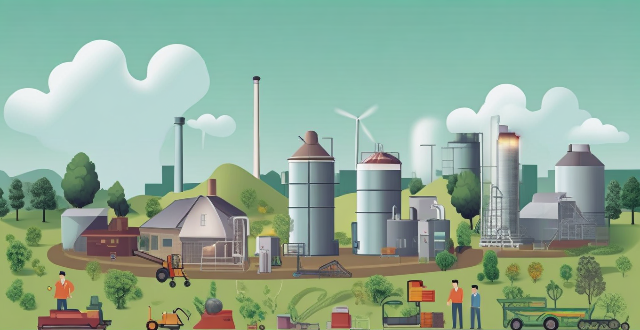The article discusses the significant role of biomass in renewable energy production. It is a type of organic matter that can be used to generate electricity, heat, or fuel. Biomass is considered a renewable energy source because it comes from living organisms that can be replenished naturally. The article explores various ways in which biomass contributes to renewable energy production, including electricity generation, heat production, transportation fuels, displacement of fossil fuels, job creation, and economic benefits. Biomass plays a crucial role in providing a sustainable source of energy while reducing our environmental impact.

The Role of Biomass in Renewable Energy Production
Biomass plays a significant role in renewable energy production. It is a type of organic matter that comes from plants, animals, and their by-products, which can be used to generate electricity, heat, or fuel. Biomass is considered a renewable energy source because it is derived from living organisms that can be replenished naturally. In this article, we will discuss the various ways in which biomass contributes to renewable energy production.
1. Electricity Generation
One of the primary uses of biomass in renewable energy production is for electricity generation. Biomass can be burned directly in boilers to produce steam, which then drives turbines to generate electricity. This process is similar to how coal-fired power plants work, but instead of using fossil fuels, biomass is used as the fuel source. Some examples of biomass used for electricity generation include wood chips, agricultural residues, and food waste.
2. Heat Production
Biomass can also be used for heat production. When burned, biomass releases heat energy that can be captured and used for heating buildings or industrial processes. This is particularly useful in areas where there is an abundance of biomass resources, such as forests or farms. Some examples of biomass used for heat production include wood pellets, straw bales, and animal manure.
3. Transportation Fuels
Biomass can also be converted into liquid transportation fuels, such as ethanol and biodiesel. These fuels can be blended with petroleum-based fuels or used in their pure form to power vehicles. Ethanol is typically produced from corn or sugarcane, while biodiesel is made from vegetable oils or animal fats. Using biomass-based fuels reduces our reliance on fossil fuels and helps reduce greenhouse gas emissions associated with transportation.
4. Displacement of Fossil Fuels
By using biomass for energy production, we can displace the use of fossil fuels, which are finite resources and contribute significantly to climate change. Replacing coal, oil, and natural gas with biomass reduces greenhouse gas emissions and air pollution, making it an environmentally friendly option for meeting our energy needs.
5. Job Creation and Economic Benefits
The use of biomass for renewable energy production also creates jobs and provides economic benefits. From harvesting and collecting biomass materials to processing them into usable forms, there are numerous opportunities for employment within the biomass industry. Additionally, investing in biomass energy infrastructure can stimulate local economies and create new markets for agricultural products and by-products.
In conclusion, biomass plays a crucial role in renewable energy production by providing a sustainable source of energy for electricity generation, heat production, transportation fuels, and displacing fossil fuels. Its use also brings economic benefits and job creation opportunities while reducing our environmental impact. As we continue to transition towards a more sustainable future, biomass will remain an essential component of our renewable energy mix.